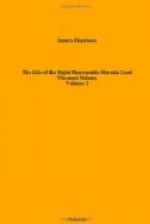In the letter to General Stuart is a recapitulation of the affairs of Naples; with the observation that such things are, if he is not dreaming! “The conduct of the Emperor,” he writes, “is to me extraordinary; the loss, at least, of his new Italian dominions, will be the natural consequence. Tuscany must drop from his family; and, whether a month sooner or later, is of little importance. You have seen the movements of Austrian armies, so have I; and found, unhappily, all their generals traders, making the most of their command, by oppressing the poor soldiers. I feel, very much, my dear general, for your situation, in the invaluable possession which your excellent judgment placed under the dominion of his majesty; and, believe me, I shall have the greatest pleasure in doing every thing you can wish me.” After observing that his force is merely nominal, and repeating his intentions, as expressed to Commodore Duckworth, his lordship concludes—“The Vanguard is at Palermo, their Sicilian Majesties desiring me not to leave them; but, the moment you want me, I fly to your assistance.”
The fact is, that Lord Nelson did not entertain apprehensions of any serious attack on Minorca; and, therefore, without weakening more essential service, prudently kept merely an eye to the remote possibility of such an event; nor did his lordship’s judgment, on this occasion, prove to be less judicious than usual.
On the 8th, our hero received a most flattering encomium, indeed, from England; which, certainly, could not fail fully to compensate for every temporary mortification which he might have experienced. This was nothing less than an elegant complimentary and congratulatory epistle, written to his lordship by Earl Howe, expressive of that noble and illustrious veteran’s high admiration of the glorious victory off the Nile. What his lordship may be supposed to have felt at the perusal of this most acceptable testimonial to his transcendent merits, cannot be more effectually impressed than by reading the following admirable answer, which he appears to have instantly written, while his heart was overflowing with gratitude.
“Palermo, 8th Jan. 1799.
“My lord,
“It was only this moment, that I had the invaluable approbation of the great, the immortal, Earl Howe; an honour the most flattering a sea-officer could receive, as it comes from the first and greatest sea-officer the world has ever produced. I had the happiness to command a band of brothers; therefore, night was to my advantage. Each knew his duty; and, I was sure, each would feel for a French ship. By attacking the enemy’s van and centre, the wind blowing directly along their line, I was enabled to throw what force I pleased on a few ships. This plan my friends readily conceived, by the signals—for which we are principally, if not entirely, indebted to your lordship—and we always keep a superior force to the enemy. At twenty-eight minutes




